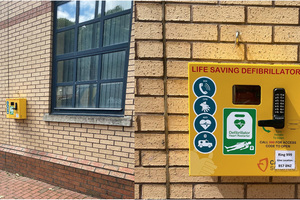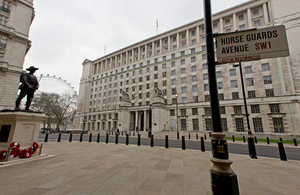Defence Secretary National Flagship Engagement Day speech
Good morning, it’s a real pleasure to be here today in Greenwich, the epicentre of Britain’s maritime heritage.
From the Prime Minister’s opening remarks and your surroundings you might just have detected some symbolism to the venue for our discussion today.
The rich history of this place reminds us that – as a proud island nation – Great Britain has always depended on great sailors and great ships, in turn dependent on great shipwrights and great shipyards.
The Cutty Sark, just a few hundred yards from here in the Painted Hall, is just one example, as one of the most innovative vessels of her age.
Built in Scotland, before sailing the world to facilitate global trade, then training future sailors and ultimately becoming an internationally recognised icon of British maritime history.
So, Greenwich is the perfect place from which to reflect not just on that heritage but on how important our shipbuilding fortunes still are to our nation’s success.
After all, this is a sector that generates billions for our economy and spreads prosperity right across the nations of our United Kingdom.
It is an industry that directly provides for the livelihoods of some 44,000 people – and their families – from Appledore to the Clyde and so many more indirectly through the supply chain.
And it’s a sector that is also a world leader in Design and Innovation, capable of creating and engineering masterpieces like the HMS Queen Elizabeth. The most powerful surface vessel we have ever built and now embarked on her maiden deployment. Not just protecting our national security, but promoting our values, interests, trade, and prosperity.
Today, the HMS Queen Elizabeth enters the South China Sea in another phase of her journey. As we strive for the Prime Minister’s ambition for ‘Global Britain’ we need our maritime industries to deliver for all of Britain.
As Shipbuilding Tsar, I want our shipbuilders to be not just more productive, but to prove themselves more competitive, innovative, ambitious, and enterprising.
Which is why today I am calling on you, our nation’s finest shipbuilders, to come forward – or perhaps I should say ‘muster’ – and to help us design and build a new National Flagship.
Our ambition is for something special, not just a cutting-edge ship, but a truly national flagship.
-
A floating embassy to promote the UK’s diplomatic and trading interests in coastal capitals around the world: hosting high level negotiations, trade shows, summits and other diplomatic talks.
-
A prestigious showcase for UK skills and expertise. Designed to incorporate leading technologies in power, propulsion and practice. Making the most of digital systems and autonomy to support its crew from the Royal Navy.
-
The greenest ship of its kind, environmentally and ecologically advanced, maximising the use of sustainable fuels and materials.
-
The source for a legacy of regional and national regeneration. Creating more apprenticeships and opening-up more opportunities for a new generation to develop highly skilled, exciting and varied careers in shipbuilding.
As such our new National Flagship will be the ‘jewel in the crown’ of our upcoming National Shipbuilding Strategy. Now, that may sound whimsical or an exaggeration, but I want to be clear – this is not just a flag ship but a flagship project to showcase to the country and the world just what British shipbuilding is capable of – innovative design, competitive build, quality service.
Underlining our intention to be the country of choice for specialist commercial vessels, yachts and naval vessels, and what we intend to do with this ship. And encouraging more nations to seek out that made-in-Britain stamp.
What I want this ship to be is at the vanguard of the 21st Century Shipping technology. British made. A British led design, built by British hands. It is our chance to inspire and to showcase to the world our skills and people, generating jobs and opportunities across our British shipyards.
There has been a lot of reporting around this ship. Not all of it accurate. So let me set out our basic aims. Subject to working through bids, competition and technology, I aim to commission the ship for between £200 and £250 million on a firm price.
The competition will run until the end of October. I hope to announce the winners in December. To begin construction in a British shipyard as early as next year and have a ship in the water by 2024 or 2025.
That’s an ambitious timescale but this is an ambitious project – the chance to break the mould and break some records to get things done in the national interest.
I’m a great believer in the power of competition to deliver results. And I’m also confident that in the UK we have the talent to succeed in that competition.
I want this ship to be as green as possible, as beautiful as this hall itself and as inspiring as Nelson. I want the grandparents of the future, to boast to their grandchildren and say one day, “I helped built that ship!”
One of the joys of my job is visiting yards and factories and meeting the young men and women who work on the projects. I also meet the sailors of the Royal Navy. All of them are immensely proud of the role they play. The Prime Minister and I believe that at the very least, we owe it to them to invest in their futures. This project will be a national endeavour and if we do it right, it will pay for itself over and over again.
This vessel, will signal the UK’s commitment, as an independent trading nation, to expanding and enhancing commerce with our key export markets around the world.
In its features, form and function, we expect its design to make waves. And we’re challenging you to deliver it at a pace never seen before in the UK.
So I have established a National Flagship Taskforce, housed in the MOD, to oversee the programme and to make sure the vessel comes in on time and on budget.
And today we are setting out the project and design principles and will provide an outline of our requirements – then it’s over to you to show us what you can do.
But I only have to look at our maritime heritage to know you will rise to the challenge.
In this hall devoted to the golden age of sail, we’re sparking a new shipbuilding renaissance. Not just creating a vessel – just like the Cutty Sark – that will ‘sail’ the seven seas for decades to come. And in doing so to become another famous flagship and to once more pilot our nation towards the shores of future prosperity.
So, thank you for joining us today, I’m excited to discover what we can all achieve together.
I want you to build, design and compete in spirit of this British endeavour in something that I know we will all be proud of. One day, hopefully, I will stand on the deck of this ship, and be able boast to ministers and manufacturers, we did it. We did it this century.

